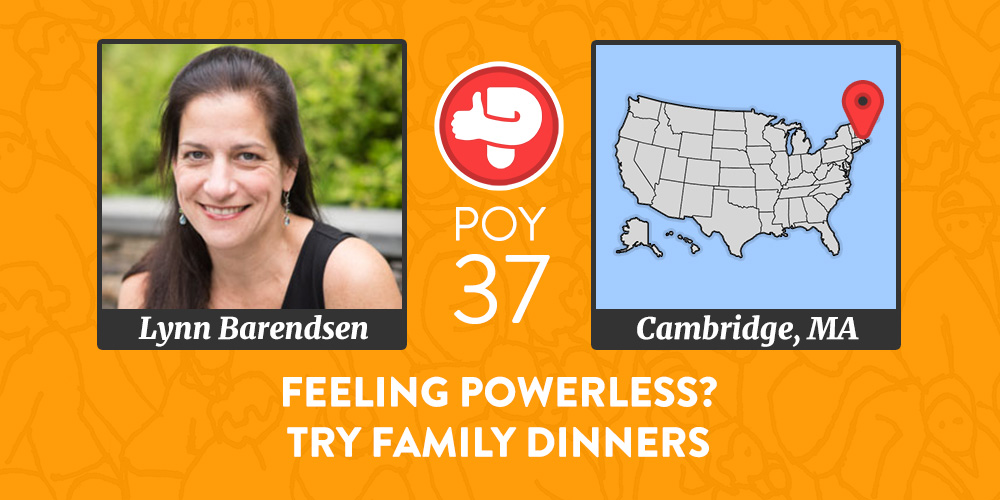Lynn Barendsen directs The Family Dinner Project at Harvard, where she and her team help American families gather around their dinner tables again.
About Lynn and The Family Dinner Project
Lynn Barendsen and her team at Harvard’s The Family Dinner Project spend their time learning from families about how they eat dinner together. They have partnered with many organizations, including the military-oriented Blue Star Families and the 92nd Street Y in New York, and held community events to ask families about the meal habits that work best for them. Their goal is to collect and share best practices with everyone involved, and to promote the benefits of eating together as a family.
“We really try to encourage families to figure out what’s right for them and help them reach their goals,” Lynn told me in Episode 37 of The Plural of You.
Why their work matters
Lynn summarized the social and psychological benefits that family members experience from eating together more often. According to her, these include lower rates of substance abuse, teen pregnancy, and depression, as well as increased self-esteem and performance in school. She’s also noted that regular conversations over meals can build children’s vocabularies faster than reading to them, and stories shared over food can build their social-emotional resilience. Regular family meals can also lower obesity rates and eating disorders.
Despite these benefits, Americans report they are eating together less often than they used to. Political scientist Robert Putnam has written about the decline. He observed that the trend has manifested differently between social groups, specifically between levels of parental education.

I asked Lynn what her sense of the trend was. Her observations were similar to Putnam’s.
“My overall impression is that [Americans aren’t] eating dinner together very often,” she said. “Some reports say that about 40 percent of families don’t have regular family meals.”
Lynn continued. “More recent reports have much higher numbers. One says that only 22 percent of families are able to set aside specific days for family meals. Of these, only 13 percent have four or more family dinners per week.”
Researchers like Putnam have offered many explanations for the trend. Most relate to parents having less time to spend at home, given increases in dual-income and single-parent households since the 1960s. Whatever the reasons may be, it’s clear that millions of Americans are missing out on the benefits of family meal times.

How you can make a difference
Family dinners are probably one of the most accessible topics I’ve covered so far on The Plural of You. Lynn offered several tips on how each of us can make family meal times a priority. Two of the key tips I gleaned included starting small and visiting the project’s website for resources (as detailed in the section below).
Lynn also pointed out that “family” doesn’t have to involve parents and children. “Families come in all shapes and sizes,” she said. For those who live alone, who don’t live near their biological families, or who don’t have children at home, the benefits of eating together can be activated with any group of close friends and acquaintances.
As Sarah Grey, the founder of Friday Night Meatballs and a previous guest on The Plural of You once told me, “You make family.” I shared this quote with Lynn, and she agreed.
Lynn added that, above all, “I think going easy on yourself and trying to find the fun is critically important.”
Now what?
Homework for you
Eating dinner with your family is one of many ways you can make a difference in the world, given the many benefits above.
If Lynn has convinced you to have dinner with your family more often, then you can start with a couple of her tips.
- Start small, maybe trying to eat together one day a week, like on Friday nights. Also, focus on one issue that’s been keeping your family from spending more time together, whether it’s schedule conflicts, emotional tension, and so on. This might take a lot of effort on your part, but you can build up to something more as long as you stay calm and be patient.
- Visit thefamilydinnerproject.org and read through the resources Lynn and her team have put together. The site includes guides, recipes, newsletters, and links to their active social media pages. If you need help at any point, please contact them.
Just remember: the best place to change society for the better is with the people under your own roof, and sharing meals with them is a good way to do that.
Further reading
- Read more about The Family Dinner Project and the benefits of family dinners at thefamilydinnerproject.org.
- You can follow The Family Dinner Project on Facebook and Twitter.
- Anne K. Fishel, a co-founder of The Family Dinner Project, explored the benefits of families eating together in her 2015 book, Home for Dinner: Mixing Food, Fun and Conversation for a Happier Family and Healthier Kids.
What Do You Think?
 I’d love to talk about your thoughts on this story or anything you’d like to share. Please email me below, leave a comment or message on Facebook, or tweet me @pluralofyou.
I’d love to talk about your thoughts on this story or anything you’d like to share. Please email me below, leave a comment or message on Facebook, or tweet me @pluralofyou.

